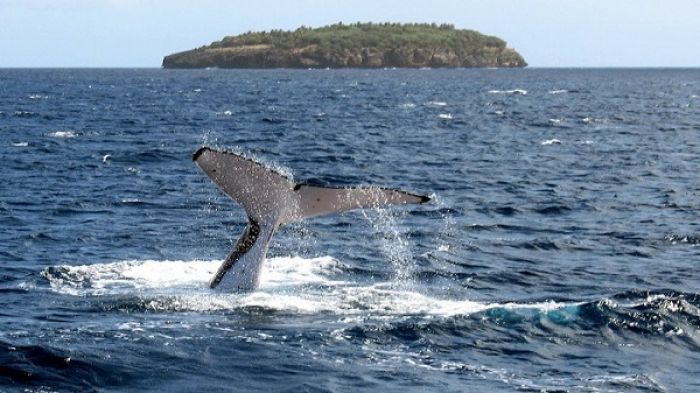Tourism disturbing whale behaviour in Vava'u - research says Featured
 A humpback whale diving near one of the islands in the Vava'u Group
A humpback whale diving near one of the islands in the Vava'u Group
18 July, 2019. New research from northern Tonga is showing that tourism is disturbing the natural behaviour of Humpback whales.
Tonga is one of the few countries in the world where it is legal for people to swim with whales, although some conservationists are calling for an end to commercial swimming with whales operations.
Humpbacks winter-over in Vava'u to give birth and mate before heading back to summer feeding grounds off Antarctica.
Auckland University of Technology's Mark Oram said Vava'u provides sheltered shallows where mothers and calves can bond and feed without interruption from amorous males looking to mate.
The coastal waters provide perfect conditions for tour operators that promote swimming with the whales.
There are now over 20 such companies and Professor Oram said data obtained by drone shows mothers are diving deeper to avoid boats, often separating themselves from calves.
He said rest times between tour operators are being ignored and the industry needs better oversight.
Professor Oram said they are working on recommendations to improve the situation.
"For example, we have some better data now on those sheltered bays that are preferred locations for mothers to give birth and spend their first few weeks with their calves. We may decide for example to set those up as sanctuary areas."
Mark Oram said these nursery areas would be no-go zones for whale-watch operators.
- RNZI
3 comments
-

Moo'oni koe Sione
There are other related issues popped out from the Article. My take was "disturbing the natural behaviour of Humpback Whales (HW)". I believe the most disturbing subject against the natural behaviour of HW is killing of the WHALES like what happen in Japan. Therefore, dear researchers should review their Article. -

YOU'RE MAKING A VALID POINT, FALAKESI...the point of the Problem Question here -- to me as a student researcher -- is the poor enforcement of whale-watching regulations: What caused the whales to change their migration habits (or population decrease)? It could be climate change, unavailability of food, or too many bulls looking for sex.
And even fictional authors like Herman Melville of the classic short story "Moby Dick" could not make the whales talk. Researchers must not draw flawed conclusions until their research data are analyzed scientifically.
Problem here is the failure to enforce existing whale watching regulations. Too much "fakapone"? We cannot blame male whales from flocking to the "Lolo" perhaps the female whales are most sexiest in Vava'u waters? -

Kuo faka'au ketau piko'ia he lau a e kau Researchers. Nenau talanoa fakafefe mo e fanga Tofua'a o ilo ai oku disturb kinautolu?
Ka ne distrub e fanga manu ni heikai toe omi ia ki Vava'u. Mou laka atu kau fakatotolo o fakatotolo'i atu ha manu kehe



